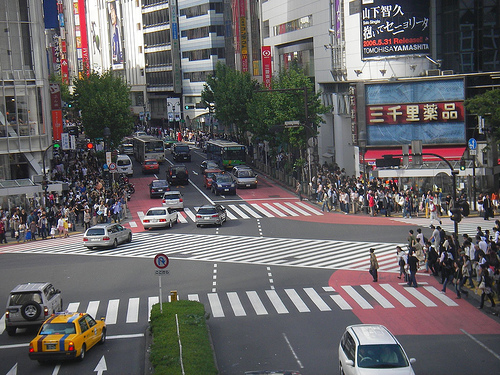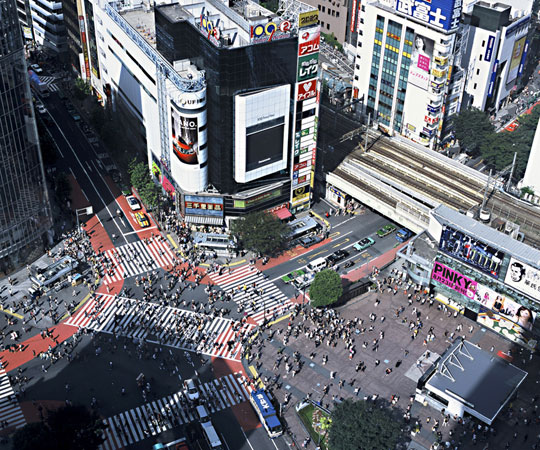
On August 11, Record China published an article based on essays written by Chinese students after their first visit to Japan. The piece, titled “How Japanese People Interpret Laws,” mainly focused on the students’ impressions of Japanese roadway rules and regulations and how strictly they are followed.”
Those readers who have had the chance to experience Japanese motorways might not have found the streets very safe at all. Narrow roads often mean narrow escapes from clogged intersections as pedestrians weave in-between eco-delivery bicyclists and taxi cabs. But compared to the hustle and bustle of mainland China, where the rules of the road mean every man for himself, Japan may very well seem an extremely tame, if not complacent, environment.
Though the walking speed of Tokyoite salarymen during their morning rush came as a bit of a surprise, the Chinese school children were even more shocked to see how Japanese people followed traffic laws so faithfully. Even when there were no cars present, pedestrians remained in their proper place at the edge of the sidewalk and waited for their light to turn green.
But why do they wait their turn to cross when there is no present danger? While living and working in Japan, it’s a common sight to see young Japanese children heavily policed when crossing the road, whether by parents or teachers. In fact, it’s cute to see the little ones listen to their teachers’ advice and raise their hands when crossing any street so as to be more noticeable to drivers. But though traffic safety is indeed taught at a very early age in Japan, the same principles are taught to young Chinese children, as well. And yet, as they grow older, people in China ignore the crosswalk directions and go whenever and wherever they can find a space.
It’s not the traffic laws themselves, but rather the attitude toward and consciousness of rules in Japan that differs so distinctly from China. The Record China report explained that Japanese people think of laws as things that are guided and enforced by the people, more so than even the government. They take it upon themselves to ensure that the rule of law is followed and take personal offense when someone violates that self-imposed responsibility. This sense of society, while impressive and truly inspiring in some ways, can also lead to tremendous pressure on the individual.
There’s a stereotype that Japanese people are incredibly humble and overly-apologetic. Sadly, there are definite, documented cases where this is true. During an incident a while back, a young Japanese traveler was kidnapped by terrorists in Iraq and killed. In the video that the terrorists recorded, the kidnapped boy apologized for “causing trouble.” Despite the horrific circumstances, the boy’s family was even publicly censured in Japan for their failure to take proper precautions and follow the laws set in place for their protection. In effect, the victims were pressured into apologizing for the incident due to the rigid sense of communal righteousness.
Nowadays, Japan firmly believes that citizens who do not uphold the law of the land are tantamount to criminals themselves, according to the Chinese news source. Though the commentary might sound a bit harsh, it does bring up a valid point about Japanese society. Even as a foreigner living overseas, there are times when you can feel the watchful gaze of the people checking to see if you’re doing things in the correct and proper way. This tremendous social and mental pressure instilled within the Japanese populace and extended throughout all the people who live within its island borders, keeps people in line and on the sidewalk.
Source: Yahoo!News Japan
Top image: LizzAubrey
Inset images: theworldisnotflat, Tokyo Five



 How do people in Japan feel about eating whale? We asked five people for their opinions
How do people in Japan feel about eating whale? We asked five people for their opinions Harrowing video sees reckless drivers ignore pedestrian crossing in Japan【Video】
Harrowing video sees reckless drivers ignore pedestrian crossing in Japan【Video】 Japanese survey finds only 23 percent of vehicles stop for pedestrians at crosswalks
Japanese survey finds only 23 percent of vehicles stop for pedestrians at crosswalks “Conbini warp” an increasing traffic problem for businesses and authorities across Japan
“Conbini warp” an increasing traffic problem for businesses and authorities across Japan What should Tokyo’s newest rail station be called? Poll asks high school girls for their opinion
What should Tokyo’s newest rail station be called? Poll asks high school girls for their opinion Japanese ramen restaurants under pressure from new yen banknotes
Japanese ramen restaurants under pressure from new yen banknotes Tokyo Tsukiji fish market site to be redeveloped with 50,000-seat stadium, hotel, shopping center
Tokyo Tsukiji fish market site to be redeveloped with 50,000-seat stadium, hotel, shopping center Red light district sushi restaurant in Tokyo shows us just how wrong we were about it
Red light district sushi restaurant in Tokyo shows us just how wrong we were about it McDonald’s new Happy Meals offer up cute and practical Sanrio lifestyle goods
McDonald’s new Happy Meals offer up cute and practical Sanrio lifestyle goods Pokémon Sleep camping suite and guestrooms coming to Tokyo Hyatt along with giant Snorlax burgers
Pokémon Sleep camping suite and guestrooms coming to Tokyo Hyatt along with giant Snorlax burgers French Fries Bread in Tokyo’s Shibuya becomes a hit on social media
French Fries Bread in Tokyo’s Shibuya becomes a hit on social media Mt. Koya planning to instate visitor’s tax to cope with huge tourist numbers
Mt. Koya planning to instate visitor’s tax to cope with huge tourist numbers Sakura tree falls on man at Sannenzaka near Kiyomizu temple in Kyoto 【Breaking News】
Sakura tree falls on man at Sannenzaka near Kiyomizu temple in Kyoto 【Breaking News】 New private rooms on Tokaido Shinkansen change the way we travel from Tokyo to Kyoto
New private rooms on Tokaido Shinkansen change the way we travel from Tokyo to Kyoto Beautiful Red and Blue Star luxury trains set to be Japan’s new Hokkaido travel stars
Beautiful Red and Blue Star luxury trains set to be Japan’s new Hokkaido travel stars All-you-can-drink Starbucks and amazing views part of Tokyo’s new 170 meter-high sky lounge
All-you-can-drink Starbucks and amazing views part of Tokyo’s new 170 meter-high sky lounge More foreign tourists than ever before in history visited Japan last month
More foreign tourists than ever before in history visited Japan last month Starbucks reopens at Shibuya Scramble Crossing with new look and design concept
Starbucks reopens at Shibuya Scramble Crossing with new look and design concept Studio Ghibli releases new action figures featuring Nausicaä of the Valley of the Wind characters
Studio Ghibli releases new action figures featuring Nausicaä of the Valley of the Wind characters Studio Ghibli glasses cases let anime characters keep an eye on your spectacles
Studio Ghibli glasses cases let anime characters keep an eye on your spectacles Is the new Shinkansen Train Desk ticket worth it?
Is the new Shinkansen Train Desk ticket worth it? Beautiful Ghibli sealing wax kits let you create accessories and elegant letter decorations【Pics】
Beautiful Ghibli sealing wax kits let you create accessories and elegant letter decorations【Pics】 Studio Ghibli releases Kiki’s Delivery Service chocolate cake pouches in Japan
Studio Ghibli releases Kiki’s Delivery Service chocolate cake pouches in Japan New definition of “Japanese whiskey” goes into effect to prevent fakes from fooling overseas buyers
New definition of “Japanese whiskey” goes into effect to prevent fakes from fooling overseas buyers Our Japanese reporter visits Costco in the U.S., finds super American and very Japanese things
Our Japanese reporter visits Costco in the U.S., finds super American and very Japanese things Studio Ghibli unveils Mother’s Day gift set that captures the love in My Neighbour Totoro
Studio Ghibli unveils Mother’s Day gift set that captures the love in My Neighbour Totoro Domino’s Japan now sells…pizza ears?
Domino’s Japan now sells…pizza ears? New Japanese KitKat flavour stars Sanrio characters, including Hello Kitty
New Japanese KitKat flavour stars Sanrio characters, including Hello Kitty New Pokémon cakes let you eat your way through Pikachu and all the Eevee evolutions
New Pokémon cakes let you eat your way through Pikachu and all the Eevee evolutions Sales of Japan’s most convenient train ticket/shopping payment cards suspended indefinitely
Sales of Japan’s most convenient train ticket/shopping payment cards suspended indefinitely Sold-out Studio Ghibli desktop humidifiers are back so Totoro can help you through the dry season
Sold-out Studio Ghibli desktop humidifiers are back so Totoro can help you through the dry season Japanese government to make first change to romanization spelling rules since the 1950s
Japanese government to make first change to romanization spelling rules since the 1950s Ghibli founders Toshio Suzuki and Hayao Miyazaki contribute to Japanese whisky Totoro label design
Ghibli founders Toshio Suzuki and Hayao Miyazaki contribute to Japanese whisky Totoro label design Doraemon found buried at sea as scene from 1993 anime becomes real life【Photos】
Doraemon found buried at sea as scene from 1993 anime becomes real life【Photos】 Tokyo’s most famous Starbucks is closed
Tokyo’s most famous Starbucks is closed One Piece characters’ nationalities revealed, but fans have mixed opinions
One Piece characters’ nationalities revealed, but fans have mixed opinions We asked a Uniqlo employee what four things we should buy and their suggestions didn’t disappoint
We asked a Uniqlo employee what four things we should buy and their suggestions didn’t disappoint Princesses, fruits, and blacksmiths: Study reveals the 30 most unusual family names in Japan
Princesses, fruits, and blacksmiths: Study reveals the 30 most unusual family names in Japan Should you drive through a red traffic light like this in Japan? Confusing road rule explained
Should you drive through a red traffic light like this in Japan? Confusing road rule explained “Daaangerrrr!” Fukuoka town experiments with new road markings
“Daaangerrrr!” Fukuoka town experiments with new road markings If the new bicycle helmet rule isn’t mandatory, are there penalties for not following it?
If the new bicycle helmet rule isn’t mandatory, are there penalties for not following it? Japanese politicians want to make walking while looking at your smartphone illegal
Japanese politicians want to make walking while looking at your smartphone illegal Possibly the most considerate pedestrian crossing button ever installed
Possibly the most considerate pedestrian crossing button ever installed Tokyo may soon require bicyclists to strap on a helmet before getting on the road
Tokyo may soon require bicyclists to strap on a helmet before getting on the road Japan’s National Police Agency plans to introduce fines for bike traffic violations in 2026
Japan’s National Police Agency plans to introduce fines for bike traffic violations in 2026 Traffic accidents kill over 300,000 per year in SE Asia, Toyota calls in Taylor Swift to help
Traffic accidents kill over 300,000 per year in SE Asia, Toyota calls in Taylor Swift to help 6 things people in Japan should watch out for when Pokémon Go lands in the country
6 things people in Japan should watch out for when Pokémon Go lands in the country Japanese YouTuber sleeps on a bed in the middle of Shibuya Scramble Crossing【Video】
Japanese YouTuber sleeps on a bed in the middle of Shibuya Scramble Crossing【Video】 Japanese custom of bowing to cars at crosswalks keeps locals safe, warms Internet’s hearts【Video】
Japanese custom of bowing to cars at crosswalks keeps locals safe, warms Internet’s hearts【Video】 Japanese youths anger police by sitting at kotatsu table at busy Kyoto intersection【Video】
Japanese youths anger police by sitting at kotatsu table at busy Kyoto intersection【Video】 Japan’s lazy, free-wheeling youth can’t even be bothered to join biker gangs anymore
Japan’s lazy, free-wheeling youth can’t even be bothered to join biker gangs anymore 9 ‘Spiritually Japanese’ Cosplayers, Cartoonists Arrested in China For ‘Anti-China Extremism’
9 ‘Spiritually Japanese’ Cosplayers, Cartoonists Arrested in China For ‘Anti-China Extremism’ Beijing to enact “Good Person Protection Ordinance”
Beijing to enact “Good Person Protection Ordinance”
Leave a Reply